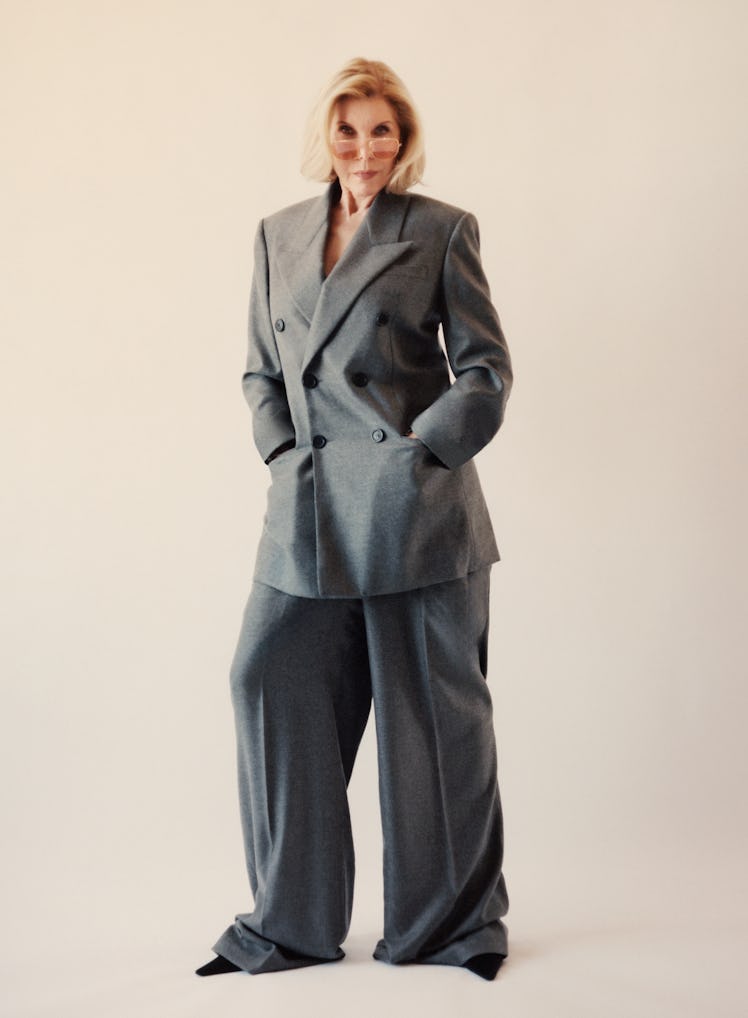Christine Baranski on Playing Women Who Push Back Against The World

For W’s annual The Originals portfolio, we asked stars of film, fashion, art, music, and more to share their insights on staying true to themselves. See this year’s full class of creatives here.
Momentum for The Gilded Age, on which you play the cantankerous socialite Agnes van Rhijn in 1880s New York City, has grown gradually but strongly since it premiered, in 2022.
The first season, people didn’t quite know what they were in for. My character certainly did a lot of exposition, saying, “This is what the old money is and this is how we live, and we have to keep the new people out.” We had to create all of these boundaries and conflicts. Once people got into the narrative, then they were really excited about following the stories of these individual characters. It draws from American history and teaches people about the beginnings of American capitalism.
I knew the show had really taken off when so many people online were going wild about drama over soup. [In season 2, two rival hostesses’ competition to entertain the Duke of Buckingham culminates in one attempting to manipulate the other’s staff into committing culinary sabotage.]
One of my castmates came to work with my picture on a T-shirt and my quotation “Heads have rolled for less.” I thought if you make it onto a T-shirt that’s being worn at a gay pride parade, you’ve certainly entered cult status.
You’re going from playing The Good Fight’s Diane Lockhart, who was very much caught up in the political moment, to a show that is a bit more escapist but still has resonant themes seems to echo a cultural shift.
Throughout the course of The Good Fight, the show’s creators were writing a liberal feminist at a time when the world that she dreamed of was suddenly moving backward. The guardrails were coming off by the final season—there’s literally civil war in the streets and the reversal of Roe v. Wade. So the show reflected what we’re living through now, which exists in complete counterpoint to the world of Agnes van Rhijn. You can’t compare Diane Lockhart to Agnes, but in a way they were both threatened as women by a new world order that is rather terrifying to them. Agnes doesn’t like all this new money—it’s all for show; it doesn’t have to do with deep values. People think she’s just this grouchy old lady, but I actually think she has a lot to be angry about. She sees society changing toward one where you can buy your way into anything.
Many of your characters have this sense of sophistication and confidence.
I was at Juilliard studying acting in the early ’70s. Even coming out of Buffalo at the age of 19, I was playing a lot of those very strong characters. I loved those types of women who push back against the world.
Are there any characters you’ve played who resonate particularly strongly with fans?
I’m always shocked because no matter where I go in the world, it’s Leonard’s mother from The Big Bang Theory. I was sitting in a beer hall in Munich, and suddenly I was surrounded by all these young men wanting my picture. And then, of course, I get women, young and old, who are obsessed with Mamma Mia!
Your big break was playing Maryann Thorpe on Cybill. A hit sitcom role can be a blessing and a curse. Were you determined to make sure that was the start of a new chapter in your career and not the peak?
I didn’t expect that level of success. I took that role because I knew my theater career simply wasn’t going to pay the bills. When I read the pilot, I thought, Gee, I know how to do this. Nobody had ever seen a woman like Maryann on television outside of Absolutely Fabulous, but that was English. Cybill was followed by Will & Grace and Sex and the City. Suddenly, women were having cocktails at lunch and being terribly sophisticated and fabulously dressed. It did change the course of my career, because I won an Emmy so quickly. Mike Nichols asked me to be in The Birdcage, and then Warren Beatty asked me to be in Bulworth. It not only opened up my television career, but suddenly I was getting some really great movie roles as well.
Christine Baranski wears a Saint Laurent by Anthony Vaccarello jacket, pants, and shoes; Retrosuperfuture sunglasses; Wolford tights.
When you were young, was there someone you looked up to?
I had a grandmother who was an actress in the Buffalo theater, an Auntie Mame type. We shared a bedroom for the first eight years of my life. She was vivacious, and she was always traveling. She would come back with suitcases with stamps from cities all over Europe. She was emotionally generous and, quite frankly, theatrical. That’s in my DNA. I remember sitting in the balcony of the Shea’s Buffalo Theatre in my teens. I saw Laurence Olivier in Othello, and there was this beautiful actress, Maggie Smith. I followed her career. You couldn’t imagine a more refined actor in terms of her technique, but she was also deeply communicative dramatically and comedically. I did have an idea of a kind of career that I wanted to have, and I have it.
Hair by Marco Santini for Sisley Products at Walter Schupfer Management; Makeup by Gianpaolo Ceciliato for Le Rouge Français at Tracey Mattingly; Fashion Assistant: Maia Wilson; Photo Assistant: Izel Villarba; Special thanks to The Carlyle, A Rosewood Hotel in New York City.